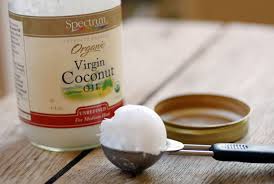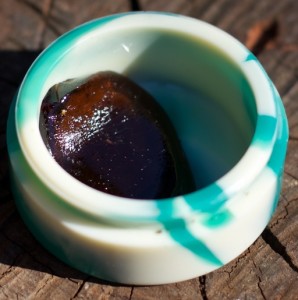Site-Wide Activity › Forums › Medicinal Cannabis Workshop › Topicals › Cannabis Coconut Balm
- This topic has 1 reply, 1 voice, and was last updated 9 years, 3 months ago by
 Radic.
Radic.
-
AuthorPosts
-
17/09/2015 at 1:16 am #613
 RadicKeymaster
RadicKeymasterCannabis Coconut Balm to Treat Cancer and Pain
Easy to make
Organic, Cold pressed Coconut Oil
mix coconut oil with hash oil
at 10:1 respectively.
Then add bees wax, 20% by volume.
That’s → 10mil of coconut oil with every 1 gram/mil of hash oil, then add beeswax 20% by volume, by eye.

Apply gentle heat, eg float the mixture of hash oil coconut oil, and beeswax, in a separate container, on top of boiling water,stir and mix well till all the bees wax is melted.
Now take a sample, eg. tea spoon, cool it, blow, blow, blow. Check it?? too hard, like lipstick? Then add some oil. Too soft and runny? Add some more beeswax, till the texture is just right to treat your affliction.
Pour into an ointment bottle, put the lid on tight, and let cool.
That’s it!Apply, as required, to control pain and kill cancer!
Topical applications are very powerful. They deliver the cannabinoids directly to the afflicted area and keep releasing cannabinoids slowly into the local area till it is all completely absorbed.
So, apply liberally to the effected areas. Massage in, apply some more, as required, to control pain and kill cancer!Combined, cannabinoids and terpenes in cannabis have natural anti-cancer, anti-bacterial and anti-fungal properties designed to fight cancer and infection.
Cannabis has protective and regenerative effects on body tissue stopping the progression of cancer to skin sores while repairing skin from herpes simplex, fever blisters, eczema, psoriasis, acne, hemorrhoids, dandruff, dry chapped skin, up to second and third degree burns to cancer.
The anti-inflammatory and anti-spasmotic properties of Cannabis help with swelling, bruising, muscle and joint pain, cramps, strains, contusions, headaches, and migrains. Anti-cancer kills brain tumors.
Analgesic qualities help patients deal with the pain associated Arthritis, Tendonitis, Carpal Tunnel, Neuropathy, PMS, Fibromyalgia, Diabetes, Multiple Sclerosis, Rheumatism, and many movement disorders.
Cannabis topically applied, used on top of the skin, is a powerful localized medicine.
-
This topic was modified 9 years, 7 months ago by
 Radic.
Radic.
-
This topic was modified 9 years, 7 months ago by
 Radic.
Radic.
-
This topic was modified 9 years, 7 months ago by
 Radic.
Radic.
-
This topic was modified 9 years, 7 months ago by
 Radic.
Radic.
-
This topic was modified 9 years, 7 months ago by
 Radic.
Radic.
-
This topic was modified 9 years, 7 months ago by
 Radic.
Radic.
-
This topic was modified 9 years, 7 months ago by
 Radic.
Radic.
-
This topic was modified 9 years, 7 months ago by
 Radic.
Radic.
-
This topic was modified 9 years, 7 months ago by
 Radic.
Radic.
-
This topic was modified 9 years, 6 months ago by
 Radic.
Radic.
-
This topic was modified 9 years, 6 months ago by
 Radic.
Radic.
-
This topic was modified 9 years, 6 months ago by
 Radic.
Radic.
27/12/2015 at 10:17 am #1315 RadicKeymaster
RadicKeymasterTransdermal delivery of cannabidiol attenuates binge alcohol-induced neurodegeneration in a rodent model of an alcohol use disorder
Excessive alcohol consumption, characteristic of alcohol use disorders, results in neurodegeneration and behavioral and cognitive impairments that are hypothesized to contribute to the chronic and relapsing nature of alcoholism. Therefore, the current study aimed to advance the preclinical development of transdermal delivery of cannabidiol (CBD) for the treatment of alcohol-induced neurodegeneration. In Experiment 1, 1.0%, 2.5% and 5.0% CBD gels were evaluated for neuroprotection. The 5.0% CBD gel resulted in a 48.8% reduction in neurodegeneration in the entorhinal cortex assessed by Fluoro-Jade B (FJB), which trended to statistical significance (p = 0.069). Treatment with the 5.0% CBD gel resulted in day 3 CBD plasma concentrations of ~ 100.0 ng/mL so this level was used as a target concentration for development of an optimized gel formulation. Experiment 2 tested a next generation 2.5% CBD gel formulation, which was compared to CBD administration by intraperitoneal injection (IP; 40.0 mg/kg/day). This experiment found similar magnitudes of neuroprotection following both routes of administration; transdermal CBD decreased FJB + cells in the entorhinal cortex by 56.1% (p < 0.05), while IP CBD resulted in a 50.6% (p < 0.05) reduction in FJB + cells. These results demonstrate the feasibility of using CBD transdermal delivery systems for the treatment of alcohol-induced neurodegeneration.
-
This topic was modified 9 years, 7 months ago by
-
AuthorPosts
- You must be logged in to reply to this topic.



